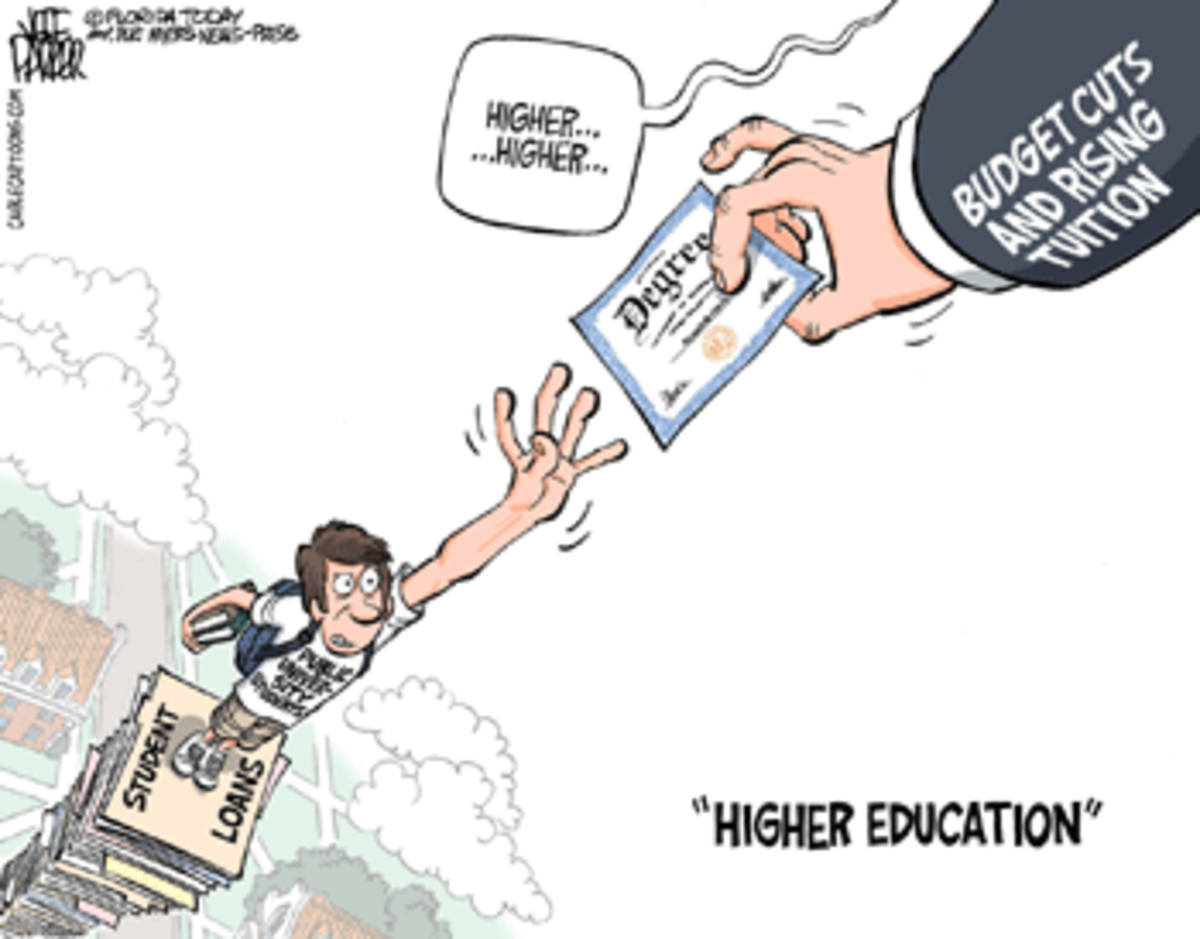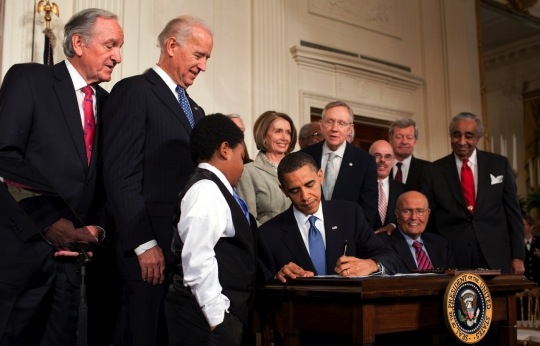Politics Matter
 I love debating politics. I will willingly get into political discussions with my friends and enjoy the back and forth. But for every person that has willingly engaged in political debates with me, there have been at least two with whom this subject is off limits. The justification ranges from “You can’t change my opinion, so there’s no point,” to “Politics is just two sides arguing, and nothing ever gets done, so there’s no point.” Hopefully, after 23 posts, you can now see the flaws in these two arguments. If not, here is one last attempt to show you that politics does matter.
I love debating politics. I will willingly get into political discussions with my friends and enjoy the back and forth. But for every person that has willingly engaged in political debates with me, there have been at least two with whom this subject is off limits. The justification ranges from “You can’t change my opinion, so there’s no point,” to “Politics is just two sides arguing, and nothing ever gets done, so there’s no point.” Hopefully, after 23 posts, you can now see the flaws in these two arguments. If not, here is one last attempt to show you that politics does matter.
It generally starts with an idea, such as universal health care. Maybe this idea has been around for a while, maybe it has been successful elsewhere, maybe it’s something nobody has ever tried before. And as the idea spreads, and as people start discussing it, more potential flaws and benefits are explored. By the time it reaches the politicians, there are enough people talking about the idea that the media start to cover it. And that’s where the idea becomes deformed. Because an idea like universal health care cannot be fully explained in a headline or a 500 word article. Because bills such as the PPACA are over 1,000 pages long. Because the amount of variables which go into something this big make it difficult for even the experts to understand.
So the media crunches it down to two sides and two corresponding arguments. Democrat and Republican. For and against. Expanded or contracted government. And this is where people who think they understand politics tend to end the debate. It becomes either a matter of “I don’t think the government should be this big period,” or “Well, the Democrats and Republicans have completely the opposite views on this issue so nothing will happen anyways.”
But what these arguments always ignore is that when it comes to politics, debate is most often followed by action. That is the purpose of the government: to govern. To adopt policies for the benefit of the people and turn them into something tangible. This is why politics matters; the debate which occurs day to day in Washington ultimately affects us. By my 27th birthday, I will have to buy health insurance or pay a fee to the government.
With such important consequences, it is imperative that people join in on the debate. Behind every single issue, there are a million factors. Which is why there can never be only two sides to a political debate, and which is why developing a policy that benefits the most people must happen. And the only way we can expect our politicians to make good decisions is if we deliberate amongst ourselves. We need to research the policies because they will affect us and many generations after us, we need to talk among ourselves to explore different viewpoints and perspectives, and we need to communicate with our representatives so they will understand what We, the People truly want.
An idea has the ability to snowball into something that affects 350 million people. And this nation has allowed our politics to be open enough that every person influence how that snowball effect occurs. Don’t stand idly behind the sidelines.
—
MC
Read More
 When Kim Il Sung brought his country victoriously out of a civil war nearly 60 years ago, the world watched in horror as the Machiavellian dictator took the reigns of a broken nation. Brainwashing the population of the newly established Democratic People’s Republic of Korea, he assumed complete control of the nation, its government, and its people.
When Kim Il Sung brought his country victoriously out of a civil war nearly 60 years ago, the world watched in horror as the Machiavellian dictator took the reigns of a broken nation. Brainwashing the population of the newly established Democratic People’s Republic of Korea, he assumed complete control of the nation, its government, and its people. Since Kim Jong Un took the reigns in 2011, North Korea has been in the news for their recent nuclear activity. And according to The Economist, “Even by its own aggressive standards, North Korea’s actions over the past couple of weeks have been extraordinary” (
Since Kim Jong Un took the reigns in 2011, North Korea has been in the news for their recent nuclear activity. And according to The Economist, “Even by its own aggressive standards, North Korea’s actions over the past couple of weeks have been extraordinary” (
 We are left with a paradox. The federal government is trying to make college more affordable, but colleges and universities are merely raising their tuition costs in response. The result is more student debt. Naturally, this opinion has drawn some criticism (
We are left with a paradox. The federal government is trying to make college more affordable, but colleges and universities are merely raising their tuition costs in response. The result is more student debt. Naturally, this opinion has drawn some criticism ( I believe that birth control should be accessible to all women, and the federal government should have the power to enforce this policy. When it comes to contraception, just like with abortion, women should have the option to choose whether to take it or not without any restrictions. However, I believe this should be taken a step further, because in order for birth control to be accessible, it must be affordable as well.
I believe that birth control should be accessible to all women, and the federal government should have the power to enforce this policy. When it comes to contraception, just like with abortion, women should have the option to choose whether to take it or not without any restrictions. However, I believe this should be taken a step further, because in order for birth control to be accessible, it must be affordable as well. So how do we make birth control available to women? This is where the debate arises. Under the PPACA, contraception must be covered by health insurance, and it is this specific provision that has religious institutions reeling. Since many churches offer forms of health insurance, and many churches are against contraception, they are fighting for exemptions to this rule. In response, President Obama’s new stance on birth control coverage allows religious institutions to shift the cost of coverage to their insurance companies. Some people believe this is too lenient of a stance (
So how do we make birth control available to women? This is where the debate arises. Under the PPACA, contraception must be covered by health insurance, and it is this specific provision that has religious institutions reeling. Since many churches offer forms of health insurance, and many churches are against contraception, they are fighting for exemptions to this rule. In response, President Obama’s new stance on birth control coverage allows religious institutions to shift the cost of coverage to their insurance companies. Some people believe this is too lenient of a stance (
 Of course, what interests me most about the PPACA is the wave of protests and criticisms it received during and after its passing. The media has portrayed it largely as a political battle between the parties, and for once, the media is right. With the exception of one abstaining Senator, all Republican representatives from both houses voted against the bill (
Of course, what interests me most about the PPACA is the wave of protests and criticisms it received during and after its passing. The media has portrayed it largely as a political battle between the parties, and for once, the media is right. With the exception of one abstaining Senator, all Republican representatives from both houses voted against the bill (
 Furthermore, the question over the constitutionality of the individual mandate and Medicaid expansions actually led to a Supreme Court case:
Furthermore, the question over the constitutionality of the individual mandate and Medicaid expansions actually led to a Supreme Court case:
Recent Comments